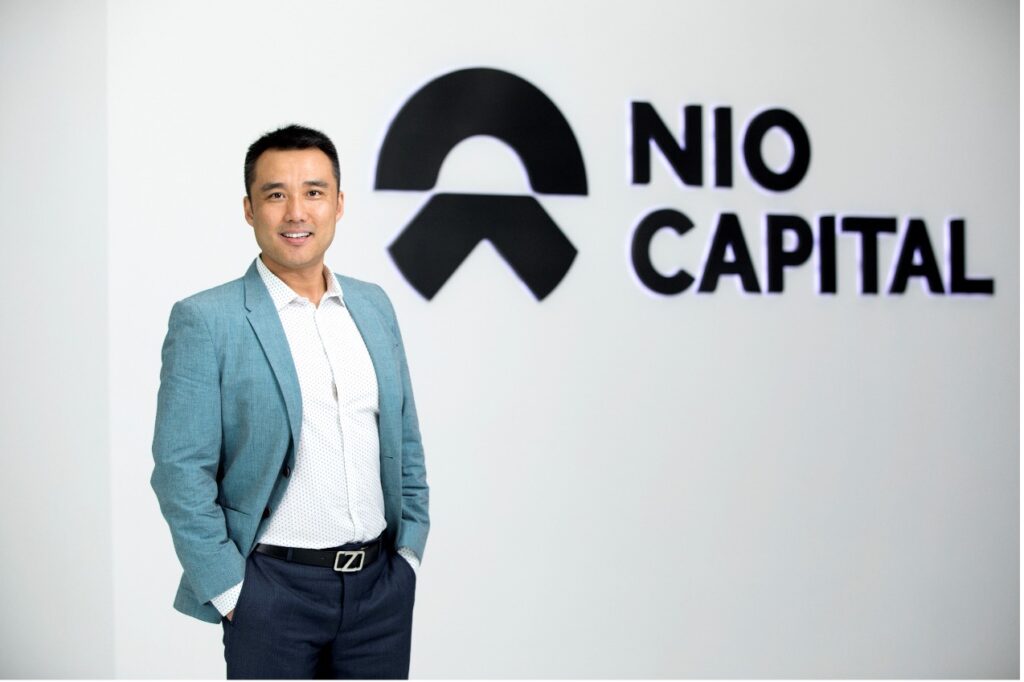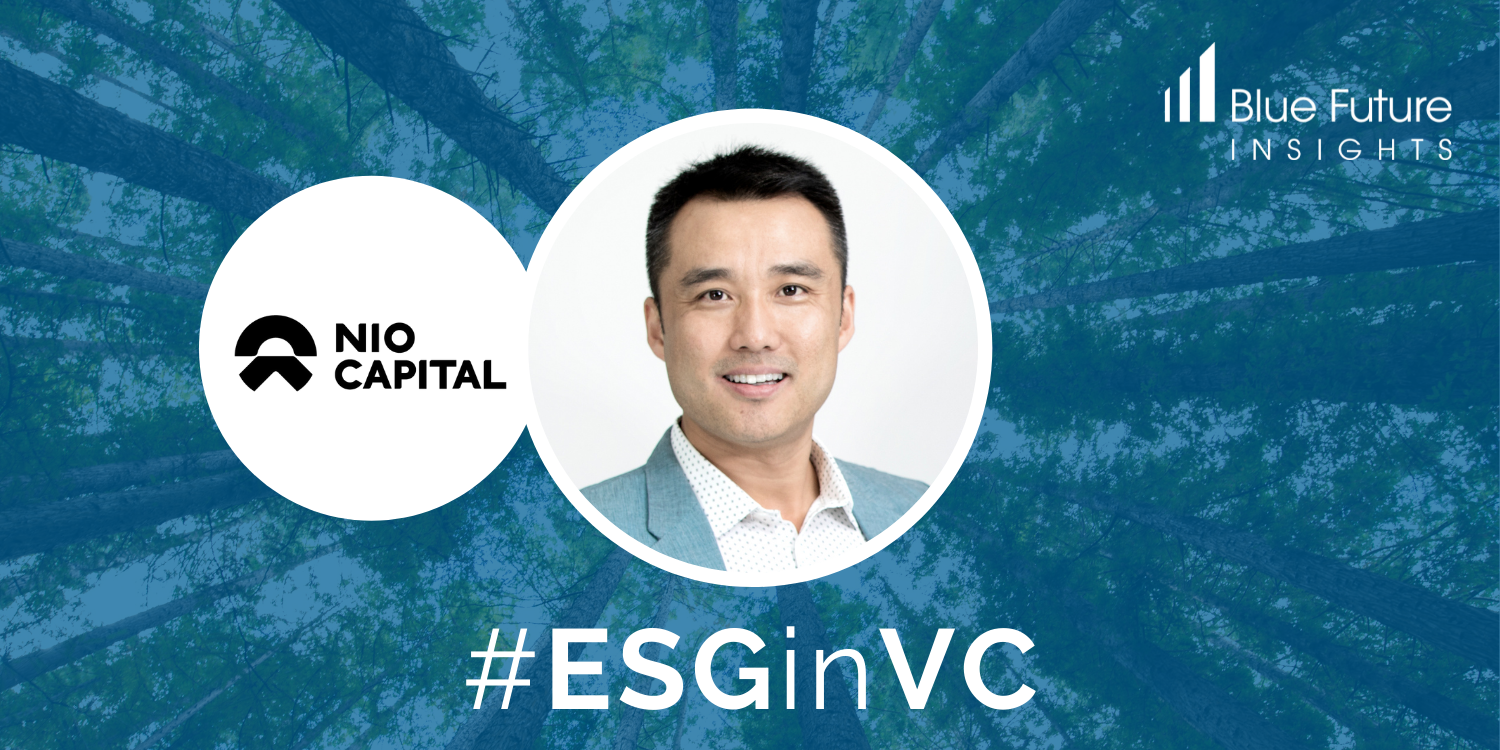With our #ESGinVC initiative, we want to foster a discussion around ESG and help each other develop and improve our frameworks. As part of this initiative, we spoke to leading managers and LPs about their ESG frameworks. The long-form interviews will be published in a reader on our website, while we will regularly post interview extracts on our social media channels (Linkedin — Twitter — Medium).
The interview below is with Ian Zhu, Managing Partner at NIO Capital.
—
NIO is one of the main players in smart electric vehicles, while NIO Capital is a leading venture capital firm in China. What relationship do you as a fund have with NIO the car manufacturer and how do you collaborate?
From our name, you can tell that we have an affiliation with NIO. First, a few words about NIO. NIO in Chinese (Weilai) means blue sky coming, which speaks to the company’s DNA to promote a happy and sustainable lifestyle. NIO has built several great smart electric vehicle products which are superior in performance relative to ICE vehicles. NIO has recently entered the European market with its launch in Norway and has announced plans to expand to various other European countries.
About Nio Capital, from the very beginning, we decided to manage our fund as an independent investment firm. We raised most of our money from external investors and have a dedicated team incentivized purely by the funds’ success. We are also independent in our investment decision-making.
Even though we operate entirely independently, we have a close affiliation with NIO. Apart from the brand name per se, there are many other fronts where we work together. NIO is a leading player in the smart EV space and has strong insights into where different technologies are headed. We can continuously tap into the NIO ecosystem and leverage resources there. Our portfolio companies might be able to provide technologies or services to NIO. Multiple departments at NIO can potentially bring deals to us and help us conduct due diligence from a technology perspective.
How does NIO Capital internally address ESG responsibility?
ESG practices are deeply embedded into the DNA of NIO Capital. Since our inception in 2016, we made a conscious choice to only invest in sustainable industries, making decarbonization innovations the central focus of our fund. When very few Chinese investment firms were in this space, we decided to invest in companies that make the mobility, logistics and energy industries more energy-efficient. This means that we, as a fund, have chosen an opportunity set centering sustainable technologies and innovations.

We also set up a negative list of industries and products that we don’t want to invest in because they might cause societal harm. For example, we don’t invest in gambling, which might be profitable but does little social good.
Meanwhile, we have been developing an internal ESG system and now have a dedicated ESG committee in place. For every deal we do, we look at the ESG risk of that particular company and categorize it according to the AIIB categorizarion system. Depending on the risk level, we will conduct various levels of due diligence to understand the risk and work with the company to mitigate the risk.
We as a GP, always try to find the best and most sustainable companies while promoting ESG awareness in the industry. It starts with our due diligence and extends to helping our companies measure their contributions to the environment and society and then communicate such results to relevant stakeholders. For example, we invested in DiDa, a leading car-pooling service that makes traffic more efficient by filling empty seats. Another company in our portfolio is Aulton, a battery swapping company. We try to help each of those companies track and note down the positive contributions they are making, such as reduction of CO2 or increase in traffic efficiency. Our companies gradually get into a habit of measuring themselves, which turns into economic benefits down the road.
Ian, you are one of the pioneers in China when it comes to ESG investing and started in this space over ten years ago at Tsing Capital. Where does the Chinese ecosystem stand in terms of ESG investments today and how are ESG practices evolving in the Chinese VC landscape?
Things are way more positive today than before, as there is now solid awareness around ESG among GPs. For one, many people see the economic possibilities here since China aims to hit peak emissions before 2030 and reach carbon neutrality by 2060. This generates many business opportunities, and people are aware that this is a very good area to invest in. Secondly, there is a strong demand for businesses to be more sustainable from a regulatory and public awareness perspective. Companies that pollute are perceived in a very negative light, which helps to promote awareness and better practices.
You also see that sustainability plays a more significant role in the education system. Chinese youngsters take courses on sustainability in schools and care about living a positive lifestyle now. All of this means that we are heading in a very positive direction.
But when it comes to the investment world, the Western LP base is still making a stronger push for sustainability than its Asian counterparts. We now see European and US investors setting up sustainability vehicles that only partner with GPs who invest in sustainability companies. In China, this climate is still forming.

From the perspective of a GP, what type of collaboration with LPs and other ecosystem players can help to promote ESG in China?
The most important thing is to encourage more GPs to adopt ESG practices. When I started in this in 2007 at Tsing Capital, there were cases where we were the only GP who asked our target companies to follow ESG requirements. Sometimes we even risk losing a good deal because we were asking too much of a potential investment! But if all the top investors and companies in China were held to the same standard, this would create a much better environment to promote ESG.
Another important thing is that LPs should provide more capital to GPs who are well-positioned on ESG. This will be a profit-driven sector, particularly when it comes to environment tech, so allocating more capital into the space makes sense.
Do you have any tips to share with GPs who want to start tackling ESG more seriously?
There are many great consultants in this space, so I would encourage GPs to hire consultants who can help them set up their ESG system. Secondly, I recommend assigning dedicated personnel for this topic. Having the right people who are trained in this space and who have the mindset is crucial. You need dedicated people, particularly at the senior level, who are entirely on board with promoting ESG.
Finally, it is vital to integrate ESG into the way you invest. It should not just function as a silo that doesn’t interact with the investment team. It needs to be deeply embedded in the investment process.
—
About Ian Zhu
Ian Zhu is a founding partner of NIO Capital and has played a vital role in building the firm’s investment team, setting up RMB and USD funds, and establishing its operations since 2016. His investment focus includes smart electric vehicles, low carbon energy networks, mobility and logistics services, and manufacturing innovations. He led NIO Capital’s investments in companies including CATL (SZSE:300750), Ronbay (SHSE:688005), Momenta, Pony.ai, Newlink, Inceptio, Black Sesame Technologies, Innovusion, TrunkTech and BoCloud.
Crunchbase
About NIO Capital
Founded in 2016, NIO Capital is a professional investment firm that focuses on investments in energy, automobiles, and deep technology sectors. NIO Capital insists on ESG sustainable investments with a focus on innovations in decarbonization and digitalization. Our portfolio companies include CATL (SZSE: 300750), Ronbay Technology (SHSE: 688005), United Winners (SHSE: 688518), Momenta, Inceptio, Pony.ai, Innovusion, Black Sesame Technologies, etc.
NIO Capital has a diversified team with deep industry background and professional investment capabilities, along with the industry’s top resources and network. We have a sound understanding of entrepreneurship and deep insights into the investment sectors. We can provide multi-dimensional support to portfolio companies, helping grow grand visions into great companies.
Website – Linkedin
About Danchun Chen
Danchun joined Blue Future Partners as an Analyst in 2020 as part of the research team. She is fascinated by the great impact of venture capital and tech startups on the future economy at a global scale. Before joining BFP, she spent time in Strategy Consulting, Startups and Venture Capital across China, France, Singapore, India and Switzerland.
Danchun holds a Master in Management from EDHEC Business School in France and a Bachelor of Arts from South China Normal University.
Linkedin
About Blue Future Partners
Blue Future Partners is a Fund of Funds with decades worth of experience in investing in Venture Capital. We specialize in backing Emerging Managers focused on early-stage technology investments. We are people-centric and relationship-driven. We have a global mandate and existing relationships with Emerging Managers in the US, Europe, Israel, China and South East Asia.
Website – Linkedin – Twitter – Medium








